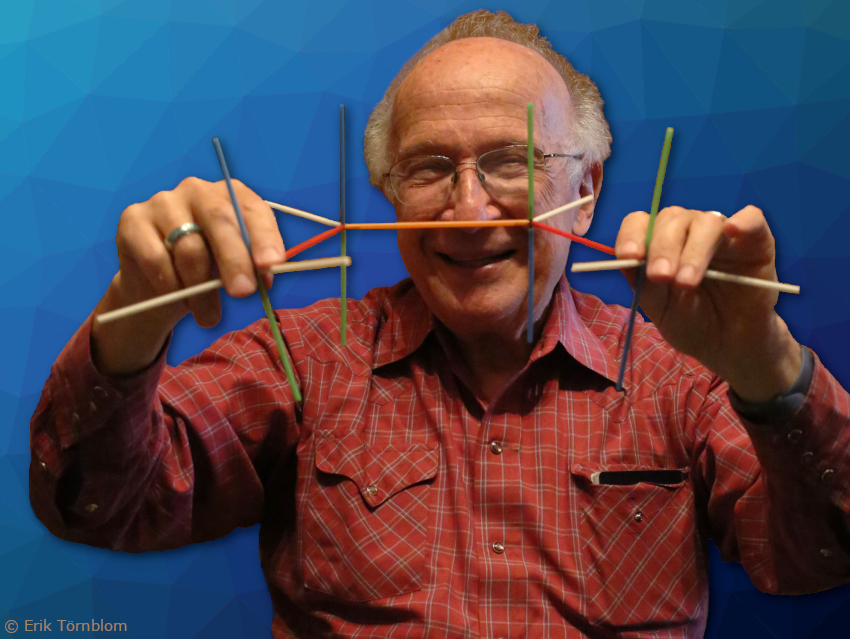Roald Hoffmann, Frank H. T. Rhodes Professor of Humane Letters, Emeritus, at Cornell University in Ithaca, New York, USA, celebrates his 85th birthday on July 18, 2022. Professor Hoffmann is a 1981 Chemistry Nobel Laureate and well-known for teaching the chemical community how to use molecular orbitals and for the Woodward–Hoffmann rules, which he developed with R. B. Woodward. He is also a poet and playwright, often incorporating science into his fictional works.
“So much chemistry remains to be understood,” he said when we asked him for advice for younger scientists. “And … don’t accept a number as an explanation; always ask “why?”.
Roald Hoffmann was born in Złoczów, Poland, on July 18, 1937. He emigrated with his family to the United States in 1949 and studied chemistry at Columbia University, New York, and Harvard University, Cambridge, MA, both USA. He received his Ph.D. from Harvard in 1962. In 1965, Roald Hoffmann joined Cornell University as Associate Professor of Chemistry. In 1968, he was appointed Professor of Chemistry, and he became John A. Newman Professor of Physical Science in 1974, then Frank H. T. Rhodes Professor of Humane Letters, and has remained at Cornell University, becoming professor emeritus.
Hoffmann’s main research interests were applied theoretical chemistry, including the electronic structure of stable and unstable molecules, and the study of transition states in reactions. He studied the structure and reactivity of organic and inorganic molecules, and examined problems in organometallic and solid-state chemistry. Hoffmann has developed semiempirical and nonempirical computational tools and methods, such as the extended Hückel method. With R. B. Woodward, he developed the Woodward-Hoffmann rules for elucidating reaction mechanisms and their stereochemistry.
Among many other honors, including over twenty-five honorary degrees and the Primo Levi Prize from the Gesellschaft Deutscher Chemiker (GDCh, German Chemical Society) and the Italian Chemical Society (Societa Chimica Italiana, SCI) in 2017 and the Maria Skłodowska-Curie Medal from the Polish Chemical Society in 2019, he has received the Nobel Prize in Chemistry in 1981 together with Kenichi Fukui. The prize was awarded “for their theories, developed independently, concerning the course of chemical reactions”.
Selected Publications
- Simulation vs. Understanding: A Tension, in Quantum Chemistry and Beyond. Part A. Stage Setting,
Roald Hoffmann, Jean-Paul Malrieu
Angew. Chem. Int. Ed. 2019.
https://doi.org/10.1002/anie.201902527 - Graphane sheets and crystals under pressure,
X.-D. Wen, L. Hand, V. Labet, T. Yang, R. Hoffmann, N. W. Ashcroft, A. R. Oganov, A. O. Lyakhov,
Proc. Natl. Acad. Sci. USA 2011, 108, 6833–6837.
DOI: 10.1073/pnas.1103145108 - Large-Scale Soft Colloidal Template Synthesis of 1.4 nm Thick CdSe Nanosheets,
Jae Sung Son, Xiao-Dong Wen, Jin Joo, Jungseok Chae, Sung-il Baek, Kunsu Park, Jeong Hyun Kim, Kwangjin An, Jung Ho Yu, Soon Gu Kwon, Sang-Hyun Choi, Zhongwu Wang, Young-Woon Kim, Young Kuk, Roald Hoffmann, Taeghwan Hyeon,
Angew. Chem. Int. Ed. 2009, 48, 6861–6864.
DOI: 10.1002/anie.200902791 - A little bit of lithium does a lot for hydrogen,
E. Zurek, R. Hoffmann, N. W. Ashcroft, A. R. Oganov, A. O. Lyakhov,
Proc. Natl. Acad. Sci. USA 2009, 106, 17640–17643.
DOI: 10.1073/pnas.0908262106 - Learning from Molecules in Distress,
Roald Hoffmann Henning Hopf
Angew. Chem. Int. Ed. 2008.
https://doi.org/10.1002/anie.200705775 - Predicting Molecules—More Realism, Please!,
Roald Hoffmann, Paul von Ragué Schleyer, Henry F. Schaefer,
Angew. Chem. Int. Ed. 2008, 47, 7164–7167.
DOI: 10.1002/anie.200801206 - Emergent reduction of electronic state dimensionality in dense ordered Li-Be alloys,
Ji Feng, Richard G. Hennig, N. W. Ashcroft, Roald Hoffmann,
Nature 2008, 451, 445–448.
DOI: 10.1038/nature06442 - The Chemical Imagination at Work in Very Tight Places,
Wojciech Grochala, Roald Hoffmann, Ji Feng, Neil W. Ashcroft,
Angew. Chem. Int. Ed. 2007, 46, 3620–3642.
DOI: 10.1002/anie.200602485 - Selection Rules for Concerted Cycloaddition Reactions,
Roald Hoffmann, R. B. Woodward,
J. Am. Chem. Soc. 1965, 87, 2046–2048.
DOI: 10.1021/ja01087a034
Also of Interest
- Webpage of Roald Hoffmann
- The Conservation of Orbital Symmetry,
R. B. Woodward, Roald Hoffmann,
Angew. Chem. Int. Ed. 1969, 8(11), 781–853.
DOI: 10.1002/anie.196907811
-

Oxygen: A Play in 2 Acts
C. Djerassi, R. Hoffmann,
Discovery in science was never simple. This historical drama builds on a real dispute around the discovery of oxygen to probe the nature of science. Then, and now.
Wiley-VCH, Weinheim, Germany, 2001.
ISBN: 978-3-527-30413-4 - Video: Why Diversity Is Important,
V. Koester, R. Hoffmann,
ChemistryViews 2018.
Nobel Laureate Roald Hoffmann explains his connection to Germany and why diversity is important for science



